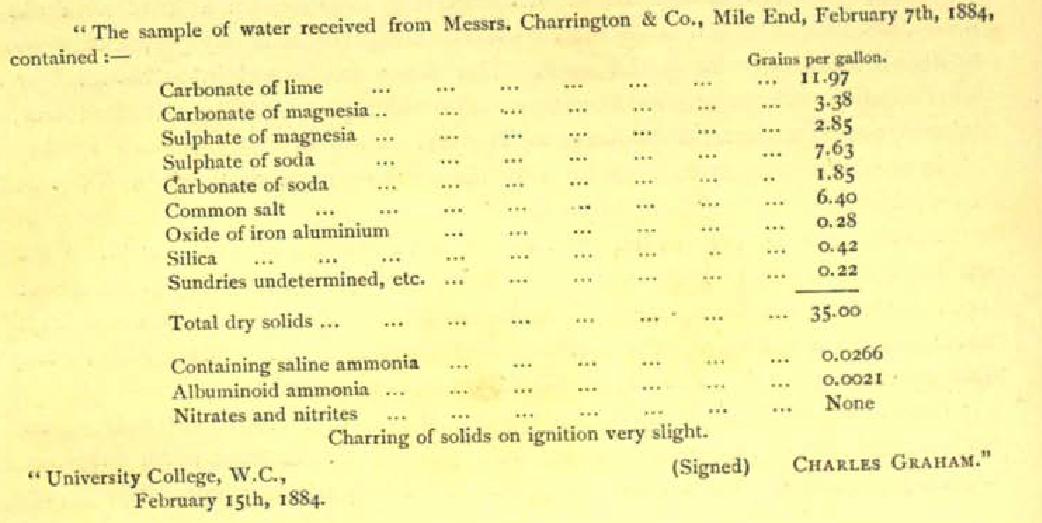Some extra points:
If you see "as CaCO3", or even just "CaCO3", the amounts are imaginary, they are not real, don't use them as if they are! If using a water calculator (you should!) it may require "Alkalinity" to be entered "as CaCO3"; so be it if that's what it wants.
I would suggest replacing the word "imaginary", by "equivalent". Such can be real, just as can be the square root of -1 when there is a particular type of mathematical problem to resolve. The difficulty is only in the way our minds have been instructed thus far.
The Dwr Cymru report doesn't even mention their "Hardness" values are "as CaCO3" (eg - "Hardness [Total] (mg/l)" ... but they are"). Perhaps Dwr Cymru are embarrassed to admit they are using an imaginary unit?

- CharringtonW-page-001.jpg (61.14 KiB) Viewed 3960 times
That's how it once was, a water sample heated and evaporated, then the dry solids analysed. Those units were later replaced, and for simplicity, hardness, permanent and temporary, were standardised in terms of calcium carbonate in milligrams per litre, and maybe 20 or 30 years later any need to state units was practically redundant. That remained uncontentious for maybe a century until in a place without a contiguous legitimate brewing science record, some amateurs introduced another unit for alkalinity.
"Hardness" is useful to get an idea of the water at a glance, but don't use it at all for any detail and in-depth analysis.
Indeed it is. An experienced brewer won't bothered with hardness, rather a full analysis of major ion content. For a rough comparison there is need to know hardness, if only for the inevitable question about hardness by others.
For a brewer, hardness is a measure of the calcium and magnesium in their water. Magnesium provides more hardness than a similar weight of calcium, about 2/3rds more, but a brewer doesn't worry about that.
Alkalinity is what a brewer needs to know, the amount present in brewing liquor can wreck or make a beer. Alkalinity can be found in several forms and might not only be present in association with calcium and magnesium. For example, alkalinity can be added using sodium carbonate or sodium bicarbonate by those with soft or RO water brewing a dark beer. Some countries' Municipal supplies are softened by ion exchange to replace calcium and magnesium with sodium, but alkalinity remains unchanged and won't be reduced by boiling.
Q. So how can we find out what level of alkalinity is present in our water?
A. It can be measured against the amount of acid required to reduce it to zero.
Titrating highly alkaline water with acid causes pH to fall, but with no direct relationship between pH and alkalinity, so it is necessary to titrate until the last vestiges of alkalinity are eliminated. This point varies marginally depending upon the the total compounds present, but pH 4.4 is near enough for any brewing process. It is possible to derive the actual inflexion point on the titration curve where it may be presumed alkalinity was extinguished, but unless someone is particularly interested in that derivation, no more will be offered.
Some take the advice to treat their liquor to a particular pH for mashing and sparging. While this is better than making no correction, there will not be equal alkalinities in different waters treated this way. My water treated this way to pH 5 and a bit can have more than twice the alkalinity of water supply to our daughter treated in the same fashion.
One beauty of using CaCO3 is that its molecular weight is (in rounded numbers) 100, the calcium 40, and the carbonate 60, easy to remember. Another is if we measure all alkalinity as CaCO3 whether it be associated with sodium or magnesium or anything else, it is simpler to determine the effect of acid(s) used to reduce alkalinity and/or the influence of that particular level of alkalinity in a mash or during a sparge.
Master this, and the rest falls neatly into place one step at a time.
Without patience, life becomes difficult and the sooner it's finished, the better.

